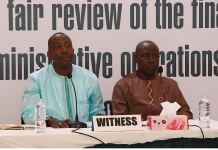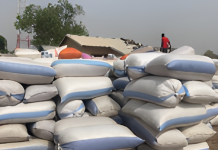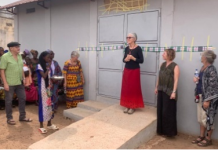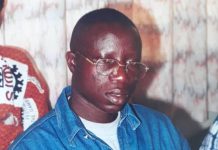By Kebba Jeffang Commissioner Med S.K Kaggwa, the Special Rapporteur on Prisons and Conditions of Detention in Africa at the launch of the guidelines on conditions of arrest, police custody and pre-trial detention in Africa expressed concern over human rights abuses and poor conditions of arrest and detention on the continent. Commissioner Kaggwa expressed pleasure for the launching of the Guidelines on the Conditions of Arrest, Police Custody and Pre-Trial Detention in Africa by the African Commission on Human and Peoples’ Rights. He said the guidelines are also called Luanda Guidelines as it was adopted in Luanda, Angola, during the 55th Ordinary Session of the ACHPR from 28th April to 12th May 2014. He said it was adopted in response to the growing concern over human rights abuses and poor conditions of arrest and detention in police custody and pre trial detention across Africa. He said the African Charter in articles 2, 3, 5, 6, 7 and 26 sets out states obligations to provide all people with the rights to life, dignity, equality, security and a fair trial and an independent judiciary. He said while there have been positive developments through various justice sector reform processes across Africa, the reality is that too many people on our continent experience limitations in relation to freedom from arbitrary arrest and detention, access to a lawyer, freedom of torture and human condition of detention. “When a suspect’s right is limited in these ways, it is clear indication that the criminal justice system is not functioning as it should. My work as the Special Rapporteur on Prisons and Conditions of Detention in Africa has demonstrated to me the importance of ensuring that law enforcement agencies exercise their power of arrest only when necessary and uphold and protect the rights enshrined in the African Charter in their pre-trial practice and procedures. The adoption of Luanda Guidelines is therefore an important step towards promoting a rights-based approach to decisions to arrest and detain suspects, and to conditions and safeguards with respect to arrest, police custody and pre trial detention,” said Mr. Kaggwa. He revealed that the Guidelines comprise nine parts, each dealing with a distinct aspect of pre trial detention. He said part one addresses the issue of arrest and sets out the grounds on which a person may be deprived of his or her liberty which he said must be very clear. He said part two is the issue of custody and part three deals with pre trial detention. ]]>
© 2019 Foroyaa Newspaper - Site by DigiTech Solutions





















